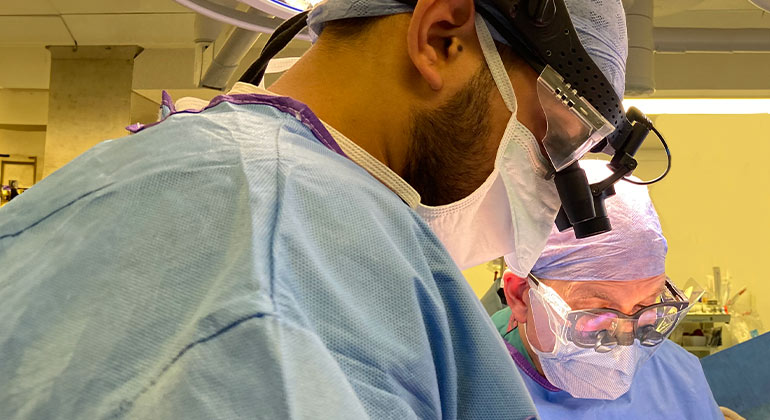
In Long Search for “a Beacon of Hope,” Woman Finds Mount Sinai Surgeon to Treat Her Head and Neck Cancer
After several years of dealing with a recurrence of adenoid cystic carcinoma (ACC), a rare cancer in the glandular tissue of the jaw area, Saniah is cancer free and doing well.
When Saniah had her first round of ACC in 2010, her surgeon treated it successfully, but he warned her that the cancer might come back, possibly in about ten years. He was correct. In 2019, Saniah began feeling a familiar piercing pain in her tooth—a symptom from her first bout of ACC. Unfortunately, the surgeon she had seen—“my angel,” she called him—had retired. So Saniah started searching for a new doctor.
Ultimately, she found expert and highly compassionate care with two Mount Sinai surgeons, Daniel Buchbinder, DMD, MD, and Mohemmed Khan, MD—the solution in her search for “a beacon of hope.”
In searching for the right care, Saniah faced a range of challenges. She does not have much of a support system in New York, as most of her family is in India. In addition, she and her husband have two young children, one of whom has special needs and requires her full attention, 24/7. Saniah was looking for a doctor who could help keep her physically and emotionally independent. She started researching, to find the best and most experienced otolaryngologist in all the major hospitals in New York City.
The first surgeon she saw explained to her and her husband that the procedure would be major and Saniah would require extensive family support, both physically and mentally, for at least six months. When Saniah panicked at that prospect, he offered to keep her in the hospital for “as long as possible, possibly a month or more.” Then she would need to recuperate from the procedure and to work on her swallowing and speech, the two most common complications after ACC surgery.
Saniah was disheartened, and told the doctor, “I don’t want to live forever. If you can just fix it a little with a minimal recovery period, so that I can live for a few more years until my children are independent, I would be grateful.” Saniah began to worry that she might not find a doctor who could treat her cancer while taking into consideration her and her family’s needs.
Saniah and her husband next saw another surgeon at a different hospital. This surgeon sent her to his team of an oral surgeon and a reconstructive plastic surgeon, who would do parts of the procedure. Saniah found that the oral surgeon was very busy and had little time to talk with her.
Next, her husband suggested exploring alternative treatments, and they went to see a doctor who focused on immunotherapy. He also suggested surgery as the only option for treatment. When she asked whether her speech would be normal after the procedure, his response was unconvincing. That—plus his plan to immediately go on a vacation the week after her procedure—were deterrents. “What if I need him after the procedure,” Saniah worried. “I wouldn't be able to talk to him.”
Eventually, Saniah found Dr. Buchbinder, Chief of Oral and Maxillofacial Surgery at the Mount Sinai Heath System and Icahn School of Medicine at Mount Sinai. Dr. Buchbinder fully evaluated her condition and her personal needs, then referred her to his colleague Dr. Khan, Assistant Professor of Otolaryngology, and Associate Director of the Head and Neck Cancer Research Program at Icahn Mount Sinai. She was reluctant, because she’d had such difficult experiences with other surgeons. But, after some persuading, she agreed to speak with him.
Saniah appreciated Dr. Khan’s approach. “He is so patient. He listens to you, which is very, very important from a patient’s point of view. He seems very down-to-earth and caring”, she says. When Saniah said she would rather have a shorter life and be able to take care of her kids while they are young, Dr. Khan remembers telling her, “You don’t have to die of this. The cancer is growing slowly—biology is in your favor. But you need to have the appropriate surgery.”
Dr. Khan and Saniah had a number of conversations until they hit on an approach that met her medical and personal needs. Dr. Khan would remove the tumor, entering through her jaw, then repair her soft and hard palate with a tissue transplant from her thigh. She wanted the surgery during her kids’ summer break, but Dr. Khan explained that he did not want to leave for his planned vacation soon after the surgery. He would do the procedure at a time that was both convenient for the family and would allow Dr. Khan to be available for any necessary follow-up. This convinced Saniah that Dr. Khan truly cared.
Saniah had the successful procedure, stayed in the hospital for 10 days, and came home fully functional and able to meet all her responsibilities. After the procedure, she had proton radiation treatment. It worked, and now Saniah is cancer-free and is fully able to swallow and speak.
She is thrilled and says, “I heartily want to thank Dr. Buchbinder for guiding me to see Dr. Khan. After traversing the corridors of four hospitals and consulting numerous surgeons in pursuit of a beacon of hope, I found my answer embodied in the remarkable Dr. Khan—a trifecta of skill, compassion, and unwavering dedication.”